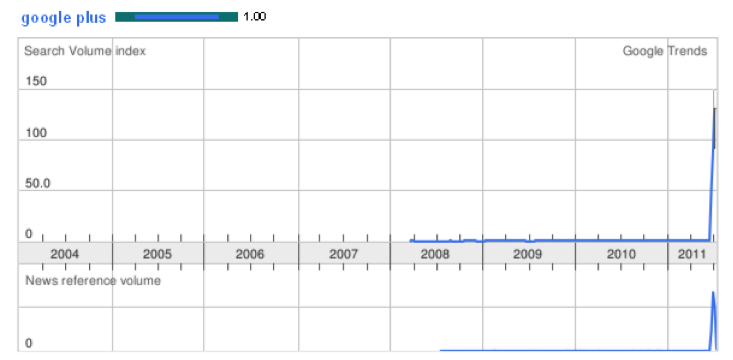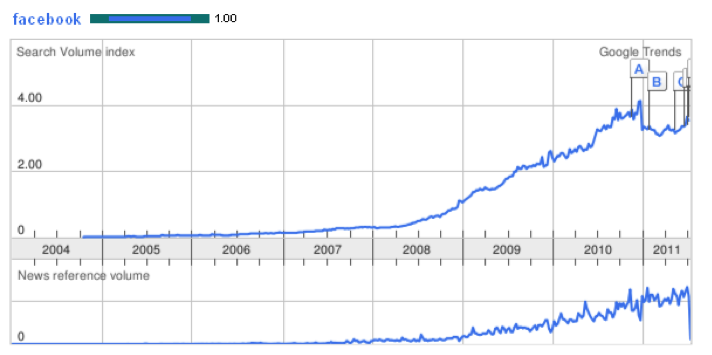A Different Sort of "Buzz" Can Potentially Sink Google+ - Matt Koppelman - MSLGROUP

"Buzz" in the communications industry is usually something we doggedly pursue. Marketing and PR departments exist to get their brands talked about. Yet we could probably poke a few holes in this axiom in the context of the world's newest social network.
Google+, still in beta, has already received more search queries and news references in its first two weeks than Facebook did for several years after it was introduced. I'm not so sure all the hype is a good thing.
Let's take a look at how search volume for Facebook and Google+ compares. After no or little search volume for Facebook for about three years, it started to grow incrementally in mid-2008. But look at Google+, which opened in beta a couple weeks ago. Search traffic has skyrocketed.

The way people are reacting to Google+ could be a function of their age. I basically group marketing professionals into two categories:
You never thought you'd see nonsensically named, Internet-based platforms like Facebook, Twitter or Plus make up such a large part of your day-to-day.
OR
You can't remember a time when they didn't.
My friends and I are in the latter category. I am 25 and was a college freshman when Facebook launched publicly in 2004. My generation "grew up" playing with Facebook when it was something cool and reserved for young people. Seven years ago, we didn't care what advertisers thought of Facebook, and they didn't have it on their radar. So Facebook grew silently, stealthily, into the powerhouse that it is today. That's why, with Google+, Gen Y'ers are happy to just play around with it—we're just happy to experiment with a new tool like we did in Facebook's infancy.
Older colleagues—or maybe cynical journalists– seem to have a different reaction. This community is analyzing Google Plus's every single move. Even Mashable is putting doomsday-like questions out there: "Google+ is reportedly approaching 18 million users but its growth is slowing down. Should Google be worried?" One man commenting on the Mashable story wrote: "Already we are worrying about the death of Google+. My oh my…"
This is not great buzz for a "known" entity.
Knowns and Unknowns
As Former US Defense Secretary Donald Rumsfeld famously said:
There are known knowns; there are things we know we know.
We also know there are known unknowns; that is to say we know there are some things we do not know.
But there are also unknown unknowns — the one we don't know we don't know.
As far as the business community is concerned, Facebook was an "unknown unknown" for several years. Again, when I was in college—call my friends and me the original Facebook Beta testers—Facebook had nothing to do with marketing, data mining or lead generation, or heck, with ANYTHING apart from finding out who that cute girl was in biology. Since no one was sure how to treat "The Book" as a marketing tool, no immediate success was required from it – and this absence of attention allowed Facebook to evolve at its own pace as a natural phenomenon. As the idea of digital and conversational marketing was nascent at the time, no one can blame marketers for casting a wary eye toward the platform back then.
Put another way, according to Facebook's own timeline, two-and-a-half full years passed (Feb. 2004 – August 2006) between launch and the first mention of any sort of advertising revenue. Even Steve Ballmer, when announcing Microsoft's 2006 investment, was still referring to Facebook as a fad.
Even without referring to the timeline, I think we all can remember what happened next – Facebook exploded.
Facebook is like the kid in baseball who was good enough to get drafted into the minors, but didn't exactly set the world on fire – and then all of a sudden, he did. No ifs, ands or buts – Facebook gradually became a "known unknown" and, in 2011, it is very much a "known known".
Hyperawareness However, the current success of this and other social networks has caused instant hyperawareness of anything described with the words "social" and/or "network."
Enter Google.
If anyone can handle being thrust into a glaringly bright spotlight, it's Google, right? The company has been operating in the limelight for more than a decade, and its executives likely have painful memories of losing out to Microsoft in 2007 when it made a 1.6% stake in Facebook. Google is hungry.
However, despite that hunger and being, well, Google, the team behind Plus is facing a significant disadvantage – partially of their own making. With Google Plus, commercial success—the ability of marketers to reach people through the network—is top of mind for everybody. Marketers are holding it to a higher standard than they ever did with Facebook in its early days.
Of course, I need to state the obvious: We are not living in 2004. In the social world of 2011, it makes sense that people are primed to analyze the latest tool. Nevertheless, with the hyper attention thrust upon it, Google Plus is like a kid who has millions of parents telling him what to do. Just a few weeks of Beta testing, including the well-publicized invite system, has caused Google Plus to jump straight to a "known known".
This is a bad thing.
Buzz Fatigue "Buzz fatigue" is already occurring in conversations:
Serious conversations are occurring about user attrition/erosion rates, something that seems quite premature given the tool isn't even out of beta testing yet! Moreover, parodies are already circulating around the web. The Google Plus Trailer, to the tune of "Creep" by Radiohead, has irreverent quips such as: "If you guys were the inventors of Facebook, you would have invented Facebook."
And this video is titled, The Google Minus Project:
The cynics seem to be saying: No users, no marketing. No marketing, no revenue. No revenue, no development. They seem to be killing the world's latest known known.
Personally I hope Google Plus has the chance to grow up.
Matt can be reached on matt (dot) koppelman (at) mslgroup.com or @ www.gplus.to/mkoppelman or on Twitter @mattkoppelman.



